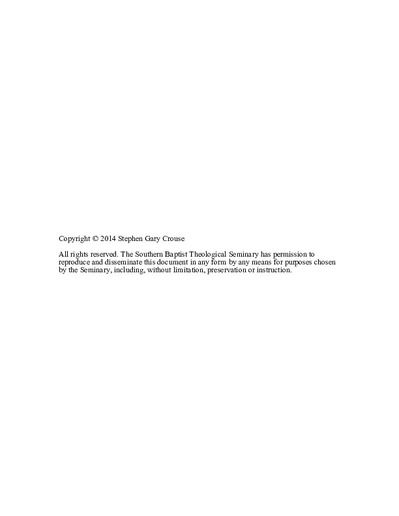A Missiological Evaluation of Southern Baptist Multiethnic Churches in the United States
Subject
Southern Baptist ConventionMission of the church
Ethnic relations--Religious aspects--Baptists
Abstract
The thesis of this dissertation is that Southern Baptist multiethnic churches exemplify the mission of the church as revealed in the Scriptures and offer a valuable strategy for reaching the increasingly diverse population of the United States. Chapter 1 introduces the ethnic segregation of Southern Baptist Churches and begins to establish a missiological foundation for ethnic inclusiveness. A discussion of the research problem including the background of the dissertation follows. The broader question of the missiological need for multiethnic congregations in the current milieu of American society is addressed. The chapter concludes with a discussion of the definitions of key terms, limitations and delimitations, and the research methodology employed.
Chapter 2 explores the mission of the church and the extent to which it applies to all peoples. The ethnic inclusiveness of the ministry of Jesus and the ethnic diversity of the New Testament churches address the need for multiethnic Southern Baptist churches. The chapter ends with a discussion of Paul's charge that Christ broke down the dividing wall of separation between the Jews and Gentiles and the implications for Southern Baptist multiethnic congregations. The focus of chapter 3 is a historical examination of Southern Baptist multiethnic churches. While many ethnicities are included in Southern Baptist life, attention is limited to African Americans and Hispanics in this historical survey. Southern Baptist churches had many African slaves among their members when the Convention was founded. The western expansion of Southern Baptists and the United States' acquisition of the Southwest territories following the Mexican American War led the young Convention to initiate mission work with Hispanics. The unequal treatment that these ethnic groups received from Anglos has lingering effects on contemporary Southern Baptist multiethnic churches. Southern Baptist attitudes about integration and the Civil Rights Movement also influenced ethnic relationships. Immigration policies and socioeconomic factors that favor the majority ethnicity create obstacles for multiethnic congregations. Contemporary Southern Baptists actions to improve ethnic relationships are examined.
An in-depth study of Donald McGavran's homogeneous unit principle and its impact on contemporary Southern Baptist multiethnic congregations is offered in chapter 4. This principle is scrutinized from a biblical and missiological perspective. The implications related to cross-cultural evangelism in light of the biblical witness conclude the chapter.
Chapter 5 segues into a critical look at worship in the twenty-six Southern Baptist multiethnic churches used for the social research. The chapter begins by defining worship as an integral part of the mission of the church. The need for an authoritative standard as a reference point in navigating the challenges of leading a multiethnic congregation to worship God is examined including data obtained through the social research. Aspects of corporate worship and their impact on multiethnic churches are explored based on the social research data. The chapter concludes by addressing ethnic inclusivism in Southern Baptist multiethnic churches and exploring the biblical notion of worshiping God in spirit and truth.
Chapter 6 offers a summation of issued raised and addressed in the dissertation. Southern Baptist multiethnic churches offer a valuable strategy for reaching the increasingly diverse population of the United States. Areas for further study are suggested.

